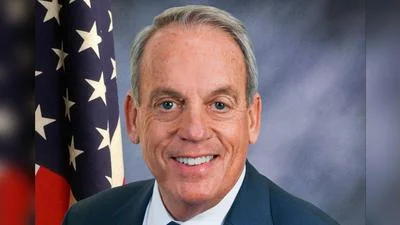Sen. Dale A. Righter (R-Matton) at the July 24 Senate Special Committee on Supplier Diversity
Sen. Dale A. Righter (R-Matton) at the July 24 Senate Special Committee on Supplier Diversity
Minority vendors’ lack of access to contracts at Illinois public universities was the subject of the inaugural hearing of the Senate Special Committee on Supplier Diversity on July 24.
Sen. Martin Sandoval (D-Chicago), the committee chair, opened the hearing by listing statistics of universities’ compliance with the Business Enterprise for Minorities, Females, and Persons with Disabilities Act (BEP Act), calling the figures woefully short.
The act mandates no less than 20 percent of all state contracts be awarded to minority-owned businesses, including those owned by women and people with disabilities.
Northern Illinois University came in at 2 percent compliance, Eastern Illinois University at 2 percent, Southern Illinois University at 3 percent, and Chicago State University didn’t comply at all and offered no BEP contracts. Sandoval said.
“It’s crucial that everyone understand exactly how people look at numbers and make judgments on those numbers,” Sen. Dale Righter (R-Mattoon), said of funding and vendor availability issues that affect the overall figures. “Judgments must be predicated on accurate information.”
Righter thanked Sandoval for moving Central Management Service (CMS) officials, who compiled the figures, to be the first panel of witnesses so CMS Deputy General Counsel Ben Jones and Acting Director Tim McDevitt could walk the committee through BEP program requirements.
After sharing some BEP details, Sen. Pamela Althoff (R-McHenry) expressed her concern for the 20-percent minimum state contract and how that changes the base level of state-appropriated dollars.
“There is a larger number in terms of dollars subject to the goal,” Jones said.
Jones' answer raised more inquiry from Righter.
“I look at the information that has been submitted by the universities, insofar as their budget and the amount of money that is applicable to the goal and the variance within their goals,” Righter said. “They range widely. Explain that to me, how is that the case?”
Jones said without being able to speak to each university individually, he could note that the variance depends on the procurement need and what they are purchasing as well as goal exemptions.
“Universities are subject to the BEP Act and they are supposed to comply with the 20-percent goal, but we don’t handle the compliance and goal-setting process for institutions of higher education,” Jones said.
Righter then wanted to know more about typical goal exemptions allotted to universities and state agencies under the BEP Act. Benefits, emergency procurements, purchase of care contracts all fall under exempted items, Jones said.
When naming off exemptions, Righter reminded Jones that payroll would be one of the exemptions to the goal.
“That is going to be a monster right off the bat and sweep off 80 percent of the budget at least,” Righter said.
Righter asked how exactly the recent lack of higher education funding has affected the universities' ability to meet BEP goals in the last decade.
Unable to answer, Jones referred the question to Higher Education Chief Procurement Officer Ben Bagby.
“I don’t think that had any particular impact, but the universities may have a different view of that,” Bagby said, adding if expenditures are constant then the relative goal is also constant.
Sen. Paul Schimpf (R-Waterloo) said he does not know as much as he would like about the BEP program since he was sworn in during 2017, although he said he was certain funding for the program falls short.
“I don’t think we are necessarily providing you with all of the resources that you need to run this program the way it needs to be run,” he said.




 Alerts Sign-up
Alerts Sign-up